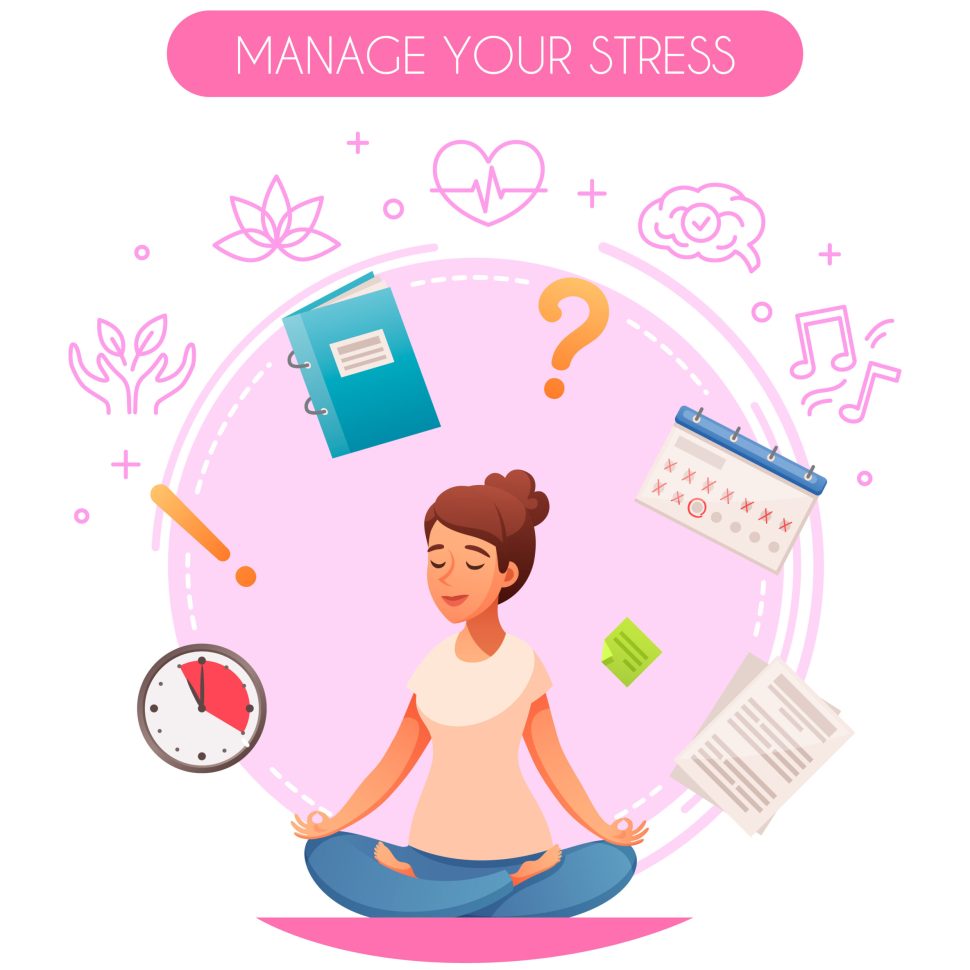
Stress has become a prevalent issue in today’s society. Stress has an impact on both our mental and physical health, and it can come from both personal and professional obligations. The good news? With the right stress management techniques, we can regain control, improve focus, and enjoy a more balanced, fulfilling life.
In this comprehensive guide, we’ll explore practical and research-backed relaxation techniques, stress reduction strategies, and mindfulness tools that can help you lead a healthier, more peaceful life.
Key Takeaways
- Learn about the science underlying stress and how it affects the body.
- Discover powerful stress relief strategies and lifestyle changes.
- Discover the most effective stress-reduction breathing exercises and relaxation methods.
- Implement mindfulness to foster long-term resilience.
- Get practical stress management tips to apply in daily life.
Table of Contents

1. Explain Stress and Its Significance
Stress is the body’s normal reaction to any pressure or risk. It sets off the “fight or flight” response, an automatic reaction meant to keep us safe when we’re in danger. This response was vital for survival when our ancestors faced physical threats like wild animals, but in today’s world, it’s more likely to be triggered by less life-threatening stressors such as deadlines, work pressure, or personal conflicts. While stress is essential for survival, chronic stress—the kind that occurs over prolonged periods—can have negative effects on both your mental and physical health.
Stress causes your body to create stress chemicals like cortisol and adrenaline, which raise blood pressure and heart rate. This can lead to issues like anxiety, insomnia, digestive problems, and even heart disease. To choose effective stress management strategies, you must first understand your unique stresses. Identifying the root causes allows you to address them effectively, whether they’re external triggers like workload or internal factors such as self-doubt.
2. How to Manage Stress: Key Principles
Before diving into specific tools and strategies, it’s important to understand a few basic principles that will shape your personal approach to stress management:
- Awareness: Recognize Your Stress Triggers
The first step to managing stress is becoming aware of the situations, people, or internal thoughts that trigger stress. Whether it’s a looming deadline, a difficult conversation, or your own negative thinking patterns, identifying what sparks stress is key to addressing it effectively.
- Balance: Learn to Say No
Many people feel under pressure to take on more than they can manage in our fast-paced environment. Overcommitment is a common cause of stress. Recognizing your limits and learning to say no when necessary is an essential part of stress management. Prioritize your tasks and accept that you cannot do everything all at once.
- Control: Focus on What You Can Influence
It’s important to focus on aspects of life you can control rather than wasting energy on things beyond your influence. For example, you have power over how you react to traffic, even though you have no influence over it. Stress reduction comes from shifting your perspective and finding healthy ways to cope with situations that are beyond your control.
These principles help shape your stress response, enabling you to create healthier routines that reduce stress and foster resilience.
3. Proven Stress Management Techniques
Even though some stress cannot be avoided, how you handle it can have a significant impact. Here are some science-backed stress management techniques that can help you regain control over your stress levels:
- Physical Activity
Regular exercise is one of the best stress management techniques available. The stress hormone cortisol is lowered and endorphins, which are organic mood enhancers, are released when you exercise. Whether it’s a brisk walk, a yoga class, or weight training, engaging in physical activity regularly helps you stay grounded and manage stress effectively. - Sleep Hygiene
Quality sleep is crucial for emotional resilience. Poor sleep can make stress harder to manage, leading to irritability and difficulty concentrating. Good sleep hygiene includes establishing a consistent bedtime routine, limiting screen time before bed, and ensuring a calm, quiet environment for sleep. By prioritizing rest, you allow your body and mind to recover from daily stress. - Time Management
Another effective stress-reduction strategy is time management. Prioritizing tasks, breaking large projects into smaller, manageable steps, and avoiding procrastination can help reduce the feeling of being overwhelmed. When you have a clear plan for your day, it becomes easier to handle stressful situations as they arise. - Social Support
Talking to friends, joining support groups, or seeking therapy can significantly reduce stress. Strong social connections provide emotional support and remind you that you’re not alone in dealing with life’s challenges. Social support is one of the most reliable forms of stress reduction, as it allows you to express emotions and gain perspective from others.
4. Relaxation Techniques to Try at Home
Relaxation isn’t just about watching TV or scrolling through social media—it involves intentional actions that soothe your nervous system. Here are a few relaxation techniques that can promote peace of mind:
- Progressive Muscle Relaxation (PMR)
Each muscle group in the body is tensed and then relaxed using this approach. Progress from your toes to your head. As you continue, see how tension and relaxation differ. PMR helps release physical tension and calms the mind, making it a great tool for stress reduction. - Visualization
Visualization involves imagining calming scenes like oceans, forests, or mountains. Close your eyes and picture a peaceful place in vivid detail—this can significantly reduce stress and anxiety. Your body’s relaxation reaction is triggered by visualization, which aids in winding down and relaxing. - Aromatherapy
We are used to the calming aromas of lavender, eucalyptus, and chamomile. Incorporating aromatherapy into your relaxation routine can help create a serene atmosphere and promote stress reduction. Just use scented candles or essential oil diffuses in your room. - Listening to Soothing Music
Music therapy has been shown to reduce stress markers such as cortisol levels. Playing calming music, such as nature sounds or instrumental tracks, can induce relaxation and ease anxiety. Incorporate this practice into your daily routine for a calming effect.
5. Mindfulness for Stress Reduction
The practice of paying close attention to the present moment with openness and without passing judgement is known as mindfulness. It’s a proven way to ease stress, sharpen focus, and support emotional balance. Here are four accessible mindfulness practices to help reduce daily stress:
- Daily Meditation
Setting aside a few quiet minutes each day for meditation can help calm the mind and reduce tension. Simply focusing on your breath or following a guided session can help you detach from overwhelming thoughts and anchor your awareness in the present. - Body Awareness Scans
A body scan is a step-by-step mental check-in with different parts of your body. Starting from your head and moving downward, this practice helps you detect tightness or unease and gently release physical stress. It’s a relaxing way to reconnect with your body and reset. - Mindful Eating Habits
Mindful eating entails concentrating on the texture, and aroma of each bite of food. It helps you slow down and become more aware of your body’s hunger and fullness signals. Additionally, it enables you to enjoy your food, which enhances your mental and physical health. - Mindful Movement or Walking
Walking consciously entails paying attention to your breathing, your body’s sensations, and each step you take. Mindful walking can help clear your mind, reduce stress, and promote a sense of calm.
6. Breathing Exercises for Stress Relief
Breathing exercises are among the simplest yet most powerful ways to calm the body in times of stress. Here are a few effective breathing techniques:
- 4-7-8 Breathing
Holding for seven seconds, exhaling for eight seconds, and inhaling for four seconds. By controlling your breathing and stimulating the parasympathetic nervous system, which aids in physical calmness, this technique encourages relaxation. - Box Breathing
Navy SEALs frequently employ box breathing, which is taking four breaths, holding them for four counts, letting them out for four counts, and then holding them for four counts again. This breathing method enhances focus, lowers stress, and encourages relaxation. - Alternate Nostril Breathing
This technique, known as Nadi Shodhana in yoga, involves breathing through one nostril at a time. Results in nervous system relaxation and energy balance in the body.
7. Lifestyle Changes for a Stress-Free Life
Living a stress-free life often comes down to the choices you make every day. Incorporating these lifestyle changes can help reduce stress and promote well-being:
- Balanced Diet
A balanced diet is key to maintaining emotional resilience. Steer clear of sugar and caffeine surges and choose whole foods like lean meats, fruits, and veggies. Proper nutrition can help stabilize your mood and energy levels throughout the day. - Digital Detox
Reducing screen time and social media browsing can help people feel less stressed and clutter-free. Try setting boundaries for device use, especially before bedtime, to improve sleep quality. - Nature Time
It has been demonstrated that spending time in nature elevates mood and lowers stress. Try to spend at least 20 minutes outdoors each day, whether in a park or garden, to experience the calming effects of nature. - Hobbies
Relaxation requires doing things that make you happy, such as hobbies. Whether it’s gardening, reading, drawing, or playing an instrument, schedule time for activities that allow you to unwind and rejuvenate.
8. Practical Stress Relief Strategies for Busy People
If you have a hectic schedule, here are a few strategies for stress relief that can fit into a busy lifestyle:
- Microbreaks
Take short 5-minute breaks between tasks to stretch or practice deep breathing. Throughout the day, these pauses might help you decompress and calm down. - Gratitude Journaling
Every day, begin by listing three things for which you are thankful. Practising gratitude has been shown to improve mood and reduce stress by shifting your focus to positive aspects of life. - Walk-and-Talk Meetings
If possible, turn meetings into walking sessions. This combines productivity with movement, promoting physical and mental health while allowing you to stay engaged with your work. - Set Boundaries
Avoid burnout by setting clear boundaries. Recognize when to say “no” and put your health before over committing.
Final Thoughts
By incorporating these practical stress management techniques, relaxation techniques, and mindfulness practices into your daily routine, you can reduce anxiety, improve focus, and live a more balanced, fulfilling life. Whether you’re managing work-related pressure or simply seeking peace of mind, adopting these stress reduction techniques will help you create a healthier, more grounded lifestyle.
More on stress and health by American Psychological Association
Struggling with Stress-Induced Pain? Discover Our Advanced Pain Management Solutions
Chronic stress can lead to persistent pain, affecting your daily activities and overall well-being. At the Pentagon Multispecialty Hospital, our Pain Management program provides comprehensive care tailored to alleviate stress-related discomfort. Our team of experts employs cutting-edge techniques to help you regain a pain-free, balanced life.
FAQs
What are the best stress management techniques?
Mindfulness, exercise, breathing exercises, and quality sleep hygiene are among the best stress management techniques.
How can I practice relaxation techniques daily?
Set aside 10 minutes each day for deep breathing, meditation, or progressive muscle relaxation.
What are the most effective methods for rapidly lowering stress?
Deep breathing, stretching, and brief nature walks are effective ways to reduce stress instantly.
How does mindfulness help in stress reduction?
Mindfulness encourages awareness and focus, helping reduce the body’s stress response.
What are effective breathing exercises for stress?
Two of the best breathing techniques for stress are box breathing and 4-7-8 breathing.
We look forward to assisting you with your healthcare needs.
Just Make an Appointment
and You’re Done!


